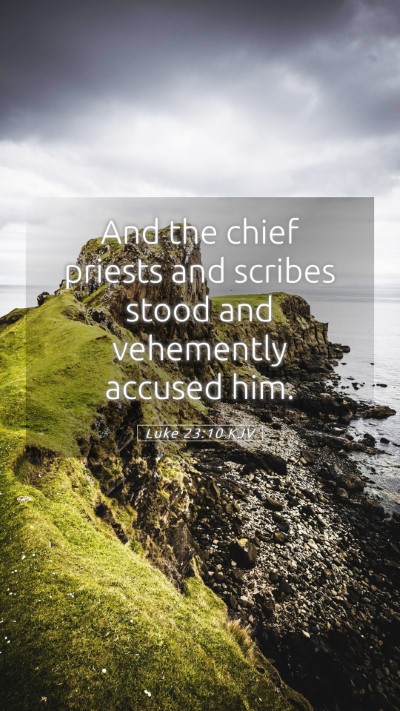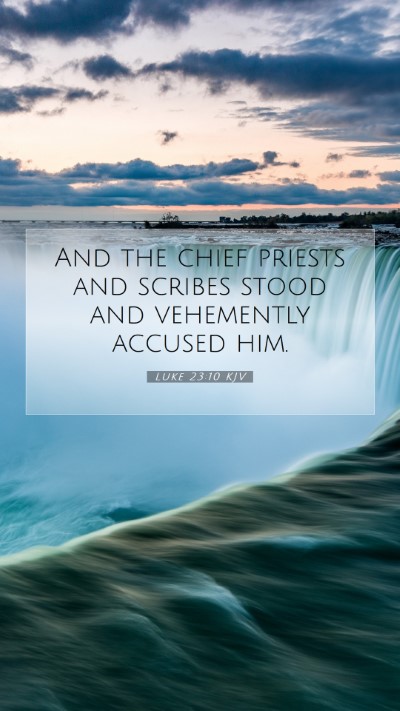Understanding Luke 23:10 - A Comprehensive Bible Verse Commentary
Verse Reference: Luke 23:10 - "And the chief priests and scribes stood and vehemently accused him."
Overview
This verse captures a moment of intense opposition faced by Jesus during His trial. It highlights the hostility from the religious leaders, who were determined to bring charges against Him. The culmination of their efforts showcases the conflict between Jesus and the established religious authorities of His time.
Scripture Analysis
The action of the religious leaders conveys a deep spiritual and social tension within the narrative of the Gospel. Their vehement accusations represent both a literal and figurative rejection of Christ's message. Below, we delve into various perspectives from notable public domain commentaries.
Matthew Henry's Commentary
Accusations of the Priests: Henry emphasizes the nature of the charges brought against Jesus, noting that they are a culmination of jealousy and fear among the religious elite. The priests and scribes were threatened by Jesus' popularity and the implications of His teachings. According to Henry, this fervent accusation was an attempt to preserve their authority and control over the people.
Albert Barnes' Notes on the Bible
The Intent of the Accusations: Barnes elaborates on the motives behind the accusations. He suggests that the religious leaders sought not only to condemn Jesus but also aimed to incite public sentiment against Him. Their vehement stance represents their unwillingness to accept Jesus as the Messiah, which is central to understanding the broader narrative of rejection that unfolds in the Gospels. The hostility reflects a larger theological conflict regarding authority, holiness, and the nature of the Kingdom of God.
Adam Clarke's Commentary
Contextual Background: Clarke provides insight into the historical backdrop of this trial. The priests and scribes' accusations took place within a larger societal context where maintaining the established order was paramount. He points out that their accusations were not just against Jesus but against the very message of grace and redemption He represented. Clarke emphasizes the important contrast between the righteousness of Christ and the unrighteous motives of religious leaders.
Significance of the Verse
Luke 23:10 encapsulates themes of injustice, persecution, and the misunderstanding of Christ's mission. The vehement nature of the accusations illustrates the ultimate rejection of divine truths by those who were supposed to be stewards of God’s word. This verse serves as a poignant reminder of the cost of righteousness and the trials faced by those who challenge the status quo.
Application to Daily Life
For contemporary readers, this verse invites a reflection on our own responses to truth and authority. It challenges us to grapple with the spirit of accusation that exists within societies and within ourselves. In moments where we may witness unjust treatment, we are called to advocate for righteousness and to reflect Christ’s love amid opposition.
Related Cross References
- Matthew 27:12-14: The silence of Jesus before His accusers.
- John 19:8-11: The further confrontation with Pontius Pilate.
- Acts 4:1-3: The persecution of the apostles reflecting the same spirit of opposition.
Conclusion
In summary, Luke 23:10 provides rich material for Bible verse commentary, interpretations, and insights into the nature of accusations faced by Jesus. This verse not only contributes to our understanding of the Gospel narrative but also prompts reflection on how we engage with truth and authority today.


